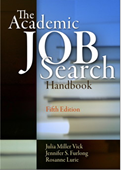Julie Miller Vick
 The Academic Job Search Handbook, 5th edition (University of Pennsylvania Press, 2016), is a comprehensive guide to finding a faculty position in any discipline. Beginning with an overview of academic careers and institutional structures, it moves step by step through the application process, from establishing relationships with advisors, positioning oneself in the market, learning about job openings, preparing CVs, cover letters, and other application materials, to negotiating offers. The handbook includes a search timetable, more than 60 sample job hunting materials from successful faculty job applicants, appendices of career resources, and a full sample application package.
The Academic Job Search Handbook, 5th edition (University of Pennsylvania Press, 2016), is a comprehensive guide to finding a faculty position in any discipline. Beginning with an overview of academic careers and institutional structures, it moves step by step through the application process, from establishing relationships with advisors, positioning oneself in the market, learning about job openings, preparing CVs, cover letters, and other application materials, to negotiating offers. The handbook includes a search timetable, more than 60 sample job hunting materials from successful faculty job applicants, appendices of career resources, and a full sample application package.
This new edition features new or updated sections on issues of current interest, such as job search concerns for pregnant or international candidates, the use of social media in the job search, strategies to address CV gaps, and challenges faced by dual-career couples, including same-sex couples. PhDs, EdDs, MFAs and others who are seeking or will seek an academic position will find in the Handbook advice and anecdotes from those who have been on the academic job search previously.
The book is authored by Penn Career Services graduate student/postdoc advisors Julie Vick and Rosanne Lurie and former Penn Career Services advisor Jenny Furlong.
Here are some quotes from Penn doctoral program graduates who used the 4th edition of the Handbook in their academic job search and provided feedback about it to Career Services in their Career Plans Surveys:
- “The academic job search is a long and stressful process, so it pays to start early. I picked up a copy of the Academic Job Search Handbook in the summer before I went on the market. It was SO incredibly useful in giving me an overview of the process. I can’t recommend it more highly.” (Assistant Professor of Advertising)
- “The Academic Job Search Handbook provides the necessary advice. It helped me a lot. Be open-minded and scale down your expectations, esp. in this academic market…” (Assistant Professor of Political Science)
- “I love the Academic Job Search Handbook!” (Assistant Professor of Music)
- “The Academic Job Search Handbook was a useful resource in preparing for interviews. Practicing answers to common interview questions ahead of time was very helpful.” (Postdoctoral Fellow, Mechanical Engineering and Applied Mechanics)
Career Services and the Penn Press make it possible for current Penn doctoral students and current Penn postdocs (who have completed at least one year of their postdoc) to purchase the book for the discounted price of $10 (with PennCard). Others may purchase it through Amazon, other booksellers, or the University of Pennsylvania Press, http://www.upenn.edu/pennpress/book/915.html, at the regular retail price of $19.95. It is also available to be read in the Career Services library.

